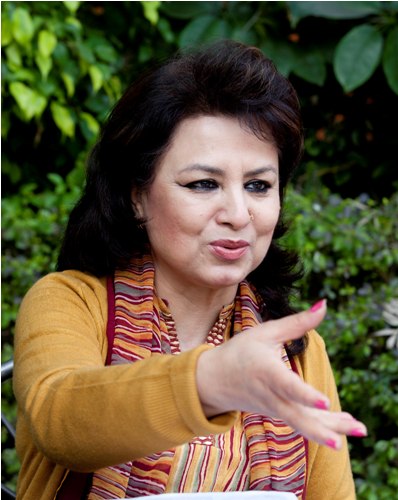 Bandana Rana, who started her career as a newscaster in 1980 and who has been working for more than 25 years on women’s rights and gender equality, is a prominent women rights activist of Nepal. The government of Nepal has recently decided to push her as a candidate for UN Committee on the Elimination of Discrimination Against Women (CEDAW) for 2017-2020. She shared with APD her stories of struggle in a recent interview. Excerpts:
Bandana Rana, who started her career as a newscaster in 1980 and who has been working for more than 25 years on women’s rights and gender equality, is a prominent women rights activist of Nepal. The government of Nepal has recently decided to push her as a candidate for UN Committee on the Elimination of Discrimination Against Women (CEDAW) for 2017-2020. She shared with APD her stories of struggle in a recent interview. Excerpts:
First of all, please tell us in brief about your media career.
I started working with Nepal Television in the late 1980s when it had just begun its operation. Somebody I knew at the Ministry of Information and Communications asked me to join the television as a news caster. He may have chosen me because I had a good command in English. Back then there was a lack of trained human resources. I faced an interview and screen test before I was selected. While working with Nepal Television, I got a chance to pursue media course in Netherlands which helped me to work professionally. I came back to Nepal and started to work again. I found myself more confident and professional than before. So the credit goes to Nepal Television for where I am today.
What inspired you to become a women rights activist?
I worked with Nepal Television as news caster, reporter and editor for 20 years. There I witnessed several forms of gender-based discrimination. This encouraged me to work in the field of women rights and gender equity. We established a non-governmental, non-profit organization called Saathi in 1992 to address contemporary challenges facing Nepali women. Saathi identified Violence Against Women (VAW) and Children as an area requiring urgent attention and intervention. Saathi has been working on these areas ever since.
I had an informal network of women journalists from various media outlets. Together we founded Sancharika Samhua in 1996. This Samuha has done a lot for the sake of women journalists. Later, we also started Sancharika Feature Sewa to encourage women journalists to write articles. We also decided to award women journalists who perform well.
Will you tell us about challenges you faced while dealing with cases of violence against women?
When we raised issue of domestic violence, we got mixed responses initially. We travelled to different villages and brought a number of cases of violence against women to the court. We came across a case in Nepalgunj where three daughters had been continuously raped by their own father for years. It was very challenging to bring those three girls to our shelter. Media supported us but many still cast suspicion on our campaign.
What are the activities Saathi is carrying out at the moment?
We are operating shelters for women and children who have suffered violence. Currently we have three shelters for women and four for children. In fact, this is a core area of our work. We mobilize communities at the village level to help solving violence against women. Since I have access with policy makers in Kathmandu and have traveled around the country I can handle all such challenges. We bring voices of women from rural parts to the policy making level. There are cases of granddaughters being raped by grandfathers, daughters being raped by fathers. This is sickening. Women and girls are not safe even within their families. Saathi looks into such cases as well.
How do you evaluate new constitution in terms of gender issue?
Things are changing. Voices are being raised for gender equality from every community. Women are being united into groups. Incidents of domestic violence have started to be reported. Men have also come in support of gender equality. They are sharing responsibilities in household. The government and political parties are more responsive towards VAW than before. Issues are being debated and policies being formed. I am happy with these positive changes. As for the constitution, it has opened the door for gender equality though few issues need to be sorted out through amendment. All in all, we are doing much better than other countries in South Asia.
What message do you want to convey to the Nepalese women?
If we stay complacent, we cannot reach the target of 50-50 parity by 2030. It’s the responsibility of every individual both man and woman to contribute to it. Let’s raise our voice and let’s do whatever we can from our side to meet this target.
(Source: Asia Pacific Daily, Kathmandu issue, March 2016)

